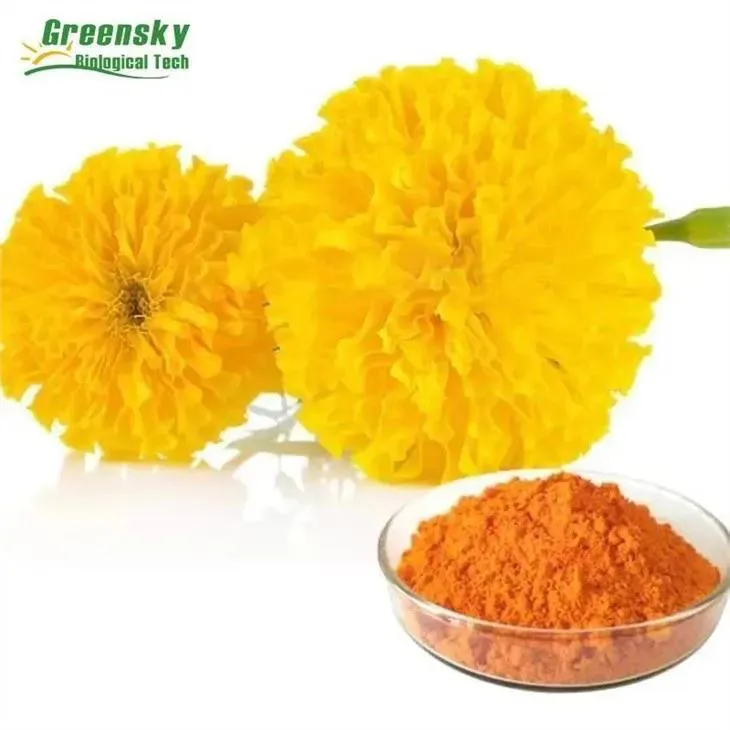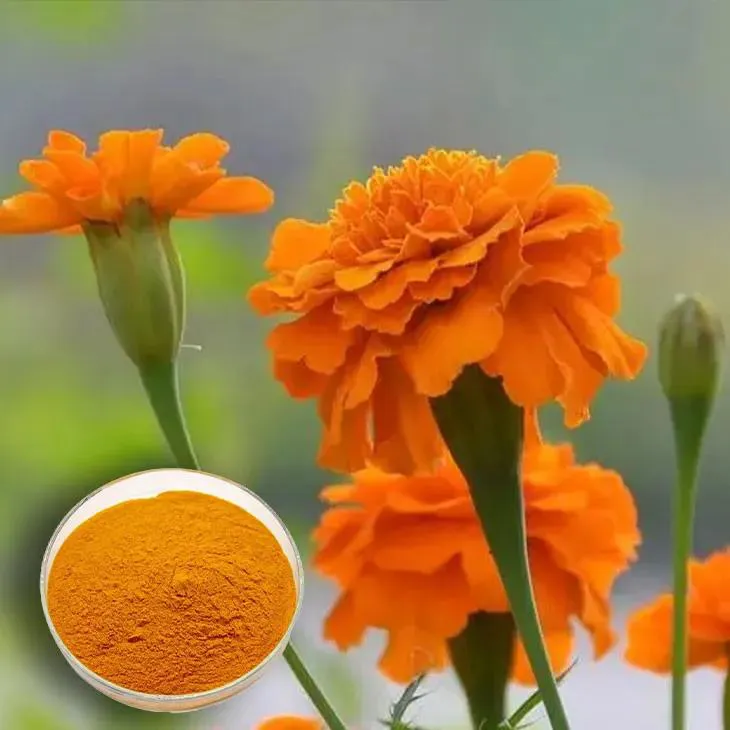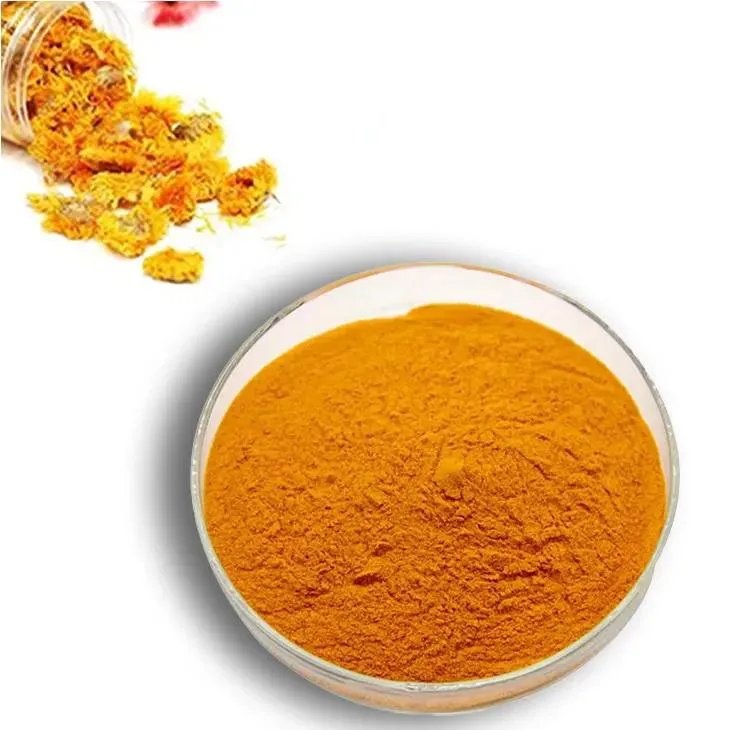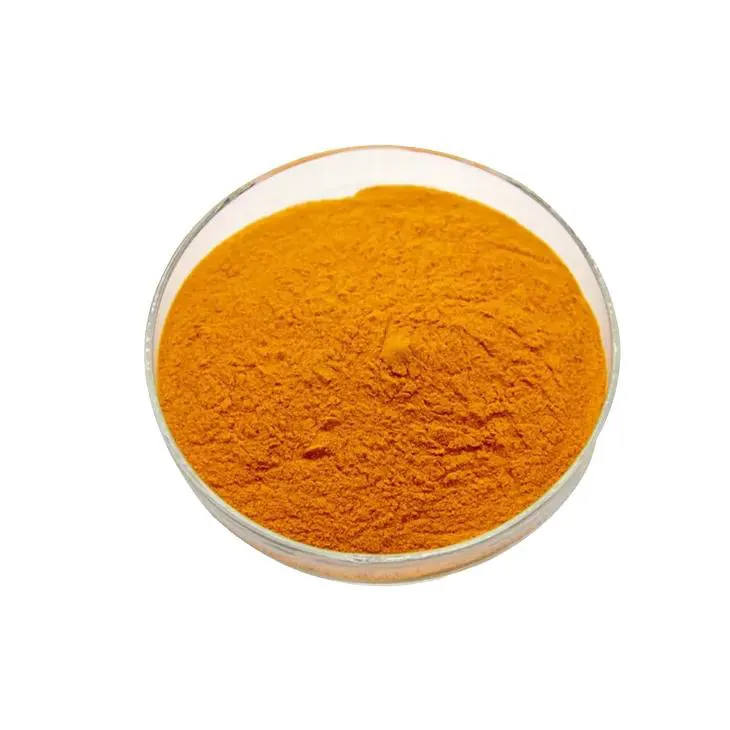- 0086-571-85302990
- sales@greenskybio.com
5 amazing things made from marigold extract.
2024-11-14

1. Cosmetics
Marigold Extract has become a popular ingredient in the cosmetics industry. One of the most significant uses is in skin care products.
Anti - aging Properties
Marigold Extract contains antioxidants such as flavonoids. These antioxidants play a crucial role in fighting free radicals in the skin. Free radicals are unstable molecules that can damage skin cells, leading to premature aging. By neutralizing these free radicals, Marigold Extract helps to reduce the appearance of wrinkles and fine lines. It also promotes collagen production. Collagen is a protein that gives the skin its elasticity and firmness. As we age, collagen production decreases, and the skin starts to sag. Marigold extract can stimulate the skin's fibroblasts, the cells responsible for collagen synthesis, thus helping to maintain a youthful complexion.
Skin Soothing
Another benefit of marigold extract in cosmetics is its skin - soothing properties. It has anti - inflammatory compounds that can calm irritated skin. This makes it ideal for use in products for sensitive skin. For example, in creams and lotions for people with eczema or rosacea, marigold extract can reduce redness and itching. It can also be used in after - sun care products. After sun exposure, the skin can become inflamed and damaged. Marigold extract helps to soothe the skin, reduce inflammation, and promote the skin's natural healing process.
Hair Care
Marigold extract is not only used in skin care but also in hair care products. It can be found in shampoos and conditioners. It helps to strengthen the hair follicles, promoting healthy hair growth. Additionally, it can add shine to the hair. The nutrients in marigold extract can penetrate the hair shaft, making the hair look healthier and more lustrous.

2. Herbal Remedies
Marigold extract has a long history of use in herbal medicine.
Wound Healing
One of the most well - known uses of marigold in herbal remedies is for wound healing. The extract has antimicrobial properties, which means it can help prevent infections in wounds. It can be applied topically in the form of a poultice or ointment. Studies have shown that marigold extract can accelerate the healing process of minor cuts, burns, and abrasions. It helps to stimulate cell regeneration at the wound site, allowing the skin to heal more quickly.
Digestive Aid
Marigold extract is also used as a digestive aid. It can be consumed in the form of a tea. The extract has been found to have anti - spasmodic properties, which can help relieve abdominal cramps. It also has a mild laxative effect, which can be beneficial for those with occasional constipation. Additionally, it may help to soothe an inflamed digestive tract, making it useful for people with conditions such as gastritis or irritable bowel syndrome.
Immune System Booster
Some herbalists believe that marigold extract can boost the immune system. It contains vitamins and minerals such as vitamin C, which is known for its immune - enhancing properties. By consuming marigold extract regularly, it is thought that the body can better defend itself against infections and diseases. However, more research is needed to fully understand the extent of its immune - boosting effects.

3. Natural Dyes
Marigold extract can be used as a natural dye, providing an alternative to synthetic dyes.
Color Varieties
Marigold extract can produce a range of colors depending on the extraction method and the fabric it is used on. It can yield warm yellow to orange hues. For example, when used on natural fibers like cotton or silk, it can create a beautiful, soft yellow color. The color is not as vibrant as some synthetic dyes but has a natural, earthy charm. It can be used to dye fabrics for clothing, home textiles such as curtains or tablecloths, or even for handicrafts.
Eco - friendly Option
Using marigold extract as a dye is an eco - friendly choice. Synthetic dyes often contain harmful chemicals that can pollute water sources during the dyeing process and disposal. In contrast, marigold extract is biodegradable and non - toxic. It is also a renewable resource, as marigolds can be easily grown in gardens or on a larger scale. This makes it an attractive option for those who are environmentally conscious and interested in sustainable textile production.

4. Food and Beverage Additives
Marigold extract can be used in the food and beverage industry as well.
Colorant in Food
As a food colorant, marigold extract is used to add a natural yellow or orange color to various products. It is commonly found in products like cheese, margarine, and baked goods. The use of natural colorants like marigold extract is becoming more popular as consumers are increasingly interested in natural and minimally processed foods. Unlike some artificial food colorings, marigold extract is safe for consumption and does not have the potential health risks associated with synthetic dyes.
Flavor Enhancer in Beverages
In the beverage industry, marigold extract can be used as a flavor enhancer. It has a subtle, floral flavor that can add depth to certain drinks. For example, it can be used in herbal teas or some specialty fruit juices. The extract can complement the other flavors in the beverage, creating a more complex and enjoyable taste experience.

5. Pest Control
Marigold extract has shown potential in pest control.
Repelling Insects
Marigold extract has a natural ability to repel certain insects. For example, it can be effective against aphids, which are common pests in gardens. The strong scent of marigold extract is thought to be unappealing to these insects, thus keeping them away from plants. It can be used in the form of a spray made from marigold extract concentrate diluted in water. Gardeners can spray this solution on their plants to protect them from aphid infestations without using chemical pesticides.
Anti - fungal Properties
Some studies have also suggested that marigold extract may have anti - fungal properties. This could be useful in preventing fungal diseases in plants. By applying marigold extract to the soil or directly on the plants, it may help to inhibit the growth of fungi that can cause diseases such as root rot or powdery mildew. However, more research is needed to fully develop marigold extract as an effective anti - fungal agent for pest control.
FAQ:
Question 1: What are the main properties of marigold extract?
Marigold extract is rich in antioxidants such as flavonoids and carotenoids. It also has anti - inflammatory properties. The presence of these substances gives it the ability to protect cells from damage, reduce inflammation in the body, and has certain antibacterial effects as well.
Question 2: How is marigold extract used in cosmetics?
In cosmetics, marigold extract is often used for its skin - soothing and anti - aging properties. It can be found in creams, lotions, and serums. It helps to moisturize the skin, reduce redness, and can even improve the appearance of fine lines and wrinkles by promoting collagen production.
Question 3: Can marigold extract be used as a herbal remedy? What for?
Yes, it can be used as a herbal remedy. Marigold extract has been traditionally used to treat minor skin irritations, such as cuts, burns, and insect bites. Due to its anti - inflammatory and antibacterial properties, it can help speed up the healing process and prevent infection.
Question 4: Are there any side effects of using products with marigold extract?
For most people, products containing marigold extract are safe. However, some individuals may be allergic to it. Symptoms of an allergic reaction can include skin rashes, itching, and swelling. It is always advisable to do a patch test before using a new product containing marigold extract.
Question 5: How is marigold extract obtained?
Marigold extract is typically obtained through a process of extraction. The flowers of the marigold plant are harvested, and then solvents such as ethanol or water are used to extract the active compounds. The resulting extract is then purified and concentrated for use in various products.
Question 6: What other products can marigold extract be used in?
Marigold extract can also be used in hair care products. It can help to strengthen the hair follicles, add shine to the hair, and prevent dandruff. Additionally, it may be used in some dietary supplements, although its use in this area is less common and should be done under medical supervision.
Related literature
- The Benefits of Marigold Extract in Cosmetics"
- "Marigold Extract: A Natural Herbal Remedy"
- "Properties and Applications of Marigold Extract"
- ▶ Hesperidin
- ▶ Citrus Bioflavonoids
- ▶ Plant Extract
- ▶ lycopene
- ▶ Diosmin
- ▶ Grape seed extract
- ▶ Sea buckthorn Juice Powder
- ▶ Fruit Juice Powder
- ▶ Hops Extract
- ▶ Artichoke Extract
- ▶ Mushroom extract
- ▶ Astaxanthin
- ▶ Green Tea Extract
- ▶ Curcumin
- ▶ Horse Chestnut Extract
- ▶ Other Product
- ▶ Boswellia Serrata Extract
- ▶ Resveratrol
- ▶ Marigold Extract
- ▶ Grape Leaf Extract
- ▶ New Product
- ▶ Aminolevulinic acid
- ▶ Cranberry Extract
- ▶ Red Yeast Rice
- ▶ Red Wine Extract
-
Hawthorn powder
2024-11-14
-
Motherwort Extract
2024-11-14
-
Beetroot Powder
2024-11-14
-
Grape Seed Extract
2024-11-14
-
Echinacea Extract
2024-11-14
-
Chia Seed Powder
2024-11-14
-
Honeysuckle Pollen
2024-11-14
-
Citrus bioflavonoids
2024-11-14
-
Ginger Extract
2024-11-14
-
Dandelion Root Extract
2024-11-14





















